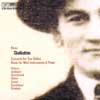Skalkottas Chamber Works
An admirable series reaches a high-point with a late, great concerto
View record and artist detailsRecord and Artist Details
Composer or Director: Nikos Skalkottas
Genre:
Chamber
Label: BIS
Magazine Review Date: 13/2003
Media Format: CD or Download
Media Runtime: 79
Mastering:
Stereo
DDD
Catalogue Number: BISCD1244

Tracks:
| Composition | Artist Credit |
|---|---|
| Quartet No. 1 |
Nikos Skalkottas, Composer
Alexei Ogrintchouk, Oboe Eric Aubier, Trumpet Marc Trenel, Bassoon Nikolaos Samaltanos, Piano Nikos Skalkottas, Composer |
| Concerto for Two Violins |
Nikos Skalkottas, Composer
Christophe Sirodeau, Piano Eiichi Chijiiwa, Violin Nikolaos Samaltanos, Piano Nikos Skalkottas, Composer Nina Zymbalist, Violin |
| Concertino for Oboe and Piano |
Nikos Skalkottas, Composer
Alexei Ogrintchouk, Oboe Nikolaos Samaltanos, Piano Nikos Skalkottas, Composer |
| Concertino for Trumpet and Piano |
Nikos Skalkottas, Composer
Eric Aubier, Trumpet Nikolaos Samaltanos, Piano Nikos Skalkottas, Composer |
| Sonata Concertante |
Nikos Skalkottas, Composer
Marc Trenel, Bassoon Nikolaos Samaltanos, Piano Nikos Skalkottas, Composer |
| Tango and Fox-trot |
Nikos Skalkottas, Composer
Alexei Ogrintchouk, Oboe Eric Aubier, Trumpet Marc Trenel, Bassoon Nikolaos Samaltanos, Piano Nikos Skalkottas, Composer |
Author: kYlzrO1BaC7A
BIS’s exploration of the music of Nikos Skalkottas has yielded nothing more fascinating than the Concerto for Two Violins, completed in 1945 but unorchestrated at his death four years later. In an perceptive booklet note, Christophe Sirodeau speculates that Skalkottas was attempting something different from his large-scale works – and, compared to the multi-layered textures of The Return of Ulysses (8/03) and Largo Sinfonico (6/98), its clear-cut formal divisions and Classical momentum do suggest a redefining, though not a simplification, of expressive means. Indeed, its emotional breadth makes it an unmistakable product of the composer’s stylistic maturity.
Despite its Allegro giocoso marking, the first movement is among Skalkottas’s most bracing sonata structures, with a development-cum-accompanied cadenza of real intensity. The Andante consists of five variations on a ‘Rembetiko’ – a melodic fusion of Greek folk and popular music – treated with rare fantasy and eloquence (even in piano score, the tutti writing is alive with imaginative ‘orchestral’ touches). The energetic rondo finale is not without humour, and its central cadenza draws together thematic elements in a maelstrom of activity, making demands which soloists Eiichi Chijiiwa and Nina Zymbalist meet head on. The elaborate, contrapuntal piano writing is dispatched with equal panache by Sirodeau and Nikolaos Samaltanos (their recording of the two-piano transcription of Ulysses on Agora is worth seeking out), so that, even were the orchestral part to be realised – musicologist Kostas Demertzis has apparently attempted such – the overall musical impact would probably not be that much greater.
The remainder of the disc consists of the so-called (though not by the composer) ‘Concert Cycle’, five pieces written during 1939-43 and forming a diverting sequence suitable as the second half of a concert. As it happens, this is the only Skalkottas work to have enjoyed a really first-rate recording before (Heinz Holliger et al on Philips, 10/95 – nla); the new accounts, though yielding marginally in sheer technical consistency, have greater character and interpretative finesse. Alexeï Ogrintchouk is elegantly plangent, and Eric Aubier pungently athletic in the Oboe and Trumpet Concertinos respectively, while Marc Trenel finds pathos and quirky charm amid the relative expanse of the Sonata Concertante. Two brief quartets frame the cycle with a jazzy nonchalance as unexpected as it is appealing. Commendably natural BIS sound, and a significant release.
Despite its Allegro giocoso marking, the first movement is among Skalkottas’s most bracing sonata structures, with a development-cum-accompanied cadenza of real intensity. The Andante consists of five variations on a ‘Rembetiko’ – a melodic fusion of Greek folk and popular music – treated with rare fantasy and eloquence (even in piano score, the tutti writing is alive with imaginative ‘orchestral’ touches). The energetic rondo finale is not without humour, and its central cadenza draws together thematic elements in a maelstrom of activity, making demands which soloists Eiichi Chijiiwa and Nina Zymbalist meet head on. The elaborate, contrapuntal piano writing is dispatched with equal panache by Sirodeau and Nikolaos Samaltanos (their recording of the two-piano transcription of Ulysses on Agora is worth seeking out), so that, even were the orchestral part to be realised – musicologist Kostas Demertzis has apparently attempted such – the overall musical impact would probably not be that much greater.
The remainder of the disc consists of the so-called (though not by the composer) ‘Concert Cycle’, five pieces written during 1939-43 and forming a diverting sequence suitable as the second half of a concert. As it happens, this is the only Skalkottas work to have enjoyed a really first-rate recording before (Heinz Holliger et al on Philips, 10/95 – nla); the new accounts, though yielding marginally in sheer technical consistency, have greater character and interpretative finesse. Alexeï Ogrintchouk is elegantly plangent, and Eric Aubier pungently athletic in the Oboe and Trumpet Concertinos respectively, while Marc Trenel finds pathos and quirky charm amid the relative expanse of the Sonata Concertante. Two brief quartets frame the cycle with a jazzy nonchalance as unexpected as it is appealing. Commendably natural BIS sound, and a significant release.
Discover the world's largest classical music catalogue with Presto Music.

Gramophone Digital Club
- Digital Edition
- Digital Archive
- Reviews Database
- Full website access
From £8.75 / month
Subscribe
Gramophone Full Club
- Print Edition
- Digital Edition
- Digital Archive
- Reviews Database
- Full website access
From £11.00 / month
Subscribe
If you are a library, university or other organisation that would be interested in an institutional subscription to Gramophone please click here for further information.




